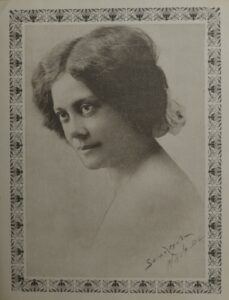Jasmine often symbolizes love and beauty. But its white blossoms sometimes have a dual meaning. By day, the flowers are small and unassuming and symbolize purity. But at night, they bloom and give off a powerful and alluring scent. So the closed Jasmine blossom has come to mean humility while its nightly bloom can also symbolize immodesty.

Courtesy of University of Delaware Library, Museums, and Press, Special Collections Museums
PS3507.U6228 G66 1899
Alice Dunbar-Nelson’s short story “The Goodness of St. Rocque,” set in New Orleans, redounds with the sights, sounds, and smells of urban gardens. For city-dwellers, urban green spaces, especially secluded enclaves such as the Rosenbach’s garden, provide a much-needed escape from the concrete jungle. Dunbar-Nelson explores the city garden’s ability to transport one to another space. Manuela, the “tall and slender and graceful” Creole main character of “The Goodness of St. Rocque,” whose “lithe form could ever be mistaken,” journeys into and out of lush gardens. “With a final summoning of a desperate courage she dived through a small wicket gate into a garden of weed-choked flowers” at one point in the story, later finding herself in a more serene garden space: “They strolled out of the dancing-room into the cool, quaint garden, where jessamines [another name for jasmine] gave out an overpowering perfume and a caged mocking-bird complained melodiously to the full moon in the sky.”

Alice Dunbar-Nelson (1875–1935), a poet, novelist, journalist, teacher, diarist, women’s suffrage organizer, civil rights leader, lecturer, political leader, and survivor of intimate partner violence, is a hero for our time. She combined her skills as an author and political activist to fight for social change. Please visit the Rosenbach’s online exhibition to explore an archive of Alice Dunbar-Nelson’s life—consisting of her diaries, letters, photographs, scrapbooks, and many other artifacts. www.alicedunbarnelson.com.

